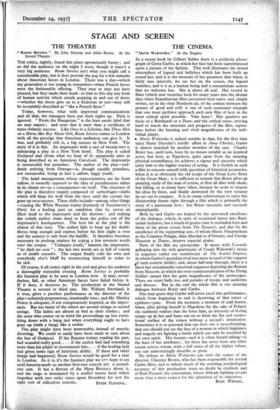- THE CINEMA
IN a recent book by Gilbert Seldes there is a publicity photo- graph of Greta Garbo, in which her face has been superimposed upon a picture of the Sphinx This well illustrates the mixed atmosphere of legend and ballyhoo which has been built up round her, and it is the measure of her greatness that when, at fairly rare intervals, we see her on the screen, the legend vanishes, and it is as a human being and a consummate actress that we welcome her. She is above all real. Her record in films (which now stretches back for many years into the distant days when Scandinavian films presented their naïve and simple stories, set in the clear Northern air, of the contest between the powers of good and evil) is one of such consistent triumph that one must perforce approach each new film of hers in the most critical spirit possible. Vain hope ! Her qualities are those of a Bernhardt or a Duse, and the critical sense, striving hard to watch the structure and progress of the film, capitu- lates before the burning and vivid magnificence of the indi- vidual player. s Marie Walewska is indeed notable in that, for the first time since Marie Dressler's terrific effort in Anna Christie, Garbo is almost matched by another member of the cast. Charles Boyer has, until now, been by no means notable as an inspired actor, but here, as Napoleon, quite apart from the amazing physical resemblance, he achieves a vigour and sincerity which carry him to the higher reaches of acting. It is foolish in such a film to concern oneself with questions of historical accuracies, when it is so obviously the old recipe of the Great Love Story of the Great Man ; it is sufficient to remark that Boyer eves an amazing study of the man of action, at first all afire with ideals, but falling, as so many have fallen, because he seeks to impose his ideas by force, and finally destroyed by the very tyranny he set out to conquer. It is no mean achievement to carry this dictatorship theme right through a film which is primarily the story of a passionate love ; but Boyer succeeds, and succeeds triumPhantly. Both he and Garbo are helped by the unwonted excellence of the dialogue, which, in spite of occasional lapses into Ruri- tanian lushness, has a touch of genius (one is reminded here and there of the prose scenes from The Dynasts), and also by the excellence of the supporting cast, of whom Maria Ouspenskaya as the Countess Peligia, Alan Marshal as d'Ornano, and George Houston as Duroc, deserve especial praise. Parts of the film are spectacular. It opens with Cossacks galloping into the rich apartments of Count Walewski's house (a sequence rather too reminiscent of The Scarlet Empress, in which Garbo's quondam rival was more in need of the support of such esoteric thrills), and, about half-way through, there is a short but sensationally conceived sequence depicting the Retreat from Moscow, in which the over-sentimentalisation of the Dying Soldier cannot blot the grim magnificence of the snowscapes. There are court balls too, and parades of troops and uniforms and dresses. But in the end the whole film is one amazing dialogue between Boyer and Garbo. One may guess that Garbo will never excel this performance, which from beginning to end is deserving of that rarest of epithets—pure. From the moment, a moment of cold horror, when, after giving herself to Napoleon for the sake of Poland, she suddenly realises that she loves him, an intensity of feeling surges up in her and beats out on us from the flat and unemo- tional surface of the screen without a second's diminution. Sometimes it is so personal that one feels one is eavesdropping, that one should not see the face of a woman in which happiness and tragedy are fighting a battle which can only be resolved by her own spirit. Her beauty—and it is often breath-taking—is the least of her attributes ; for there has never been any other screen actress whom, with a full sense of all the higher values, one can unhesitatingly describe as great. No tribute to Marie Walewska can omit the names of the director, Clarence Brown, who has been responsible for several Garbo films, and to whom much of the unerring psychological accuracy of this production must no doubt be credited, and of Karl Freund, the cameraman, whose delicate lighting reveals more than a mere respect for the splendour of its objectives.
BASH. WRIGHT.


































 Previous page
Previous page